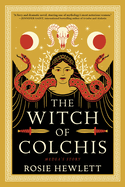
A legendary witch and murderer takes center stage in a particularly vulnerable portrayal of her life story in Rosie Hewlett's The Witch of Colchis, originally published in the United Kingdom as Medea.
Ever since she was a child, Medea was reviled for her talent for magic. Although she was a princess, her father was abusive, her brother cruel, and her mother distant. She had a brief reprieve for a few years when she was allowed to study with her aunt, the sorceress Circe. As she matured, her father put her magic to use but valued her only as a tool. When the quest for the Golden Fleece brings Jason to her father's kingdom, is it any wonder that Medea is willing to open herself to the darkest magic to seize her opportunity to escape?
Hewlett's retelling of Medea's story remains largely faithful to classical sources in terms of events, but the way she unites stories from Apollonius Rhodius's Argonautica, Euripides's Medea, and beyond, with focuses on Medea's youth at her meeting with Jason and her tightly circumscribed life as the daughter of a ruthless king, lends the novel an additional layer of pathos. Euripides's Medea might be a sympathetic figure of righteous fury, but Hewlett's version hints at her trauma and depression, conditions for which Medea does not have words, given the time in which she lived. Although Hewlett's prose is less poetic than Madeline Miller's Circe, readers of that novel who need more powerful women of mythology will be well served by The Witch of Colchis. --Kristen Allen-Vogel, information services librarian at Dayton Metro Library

